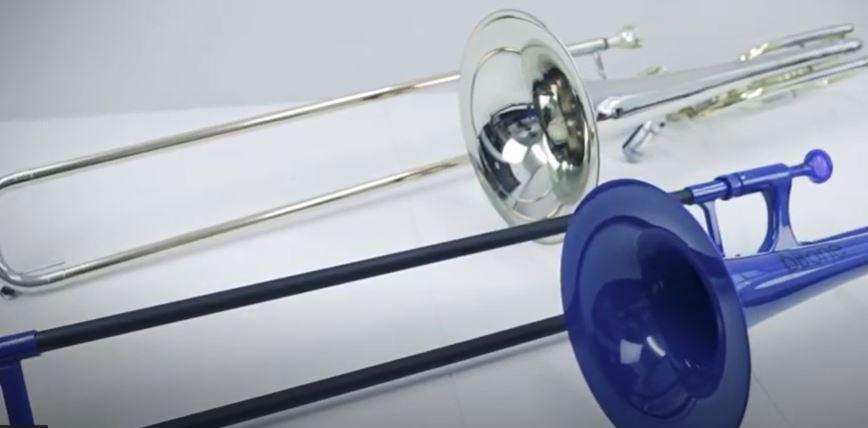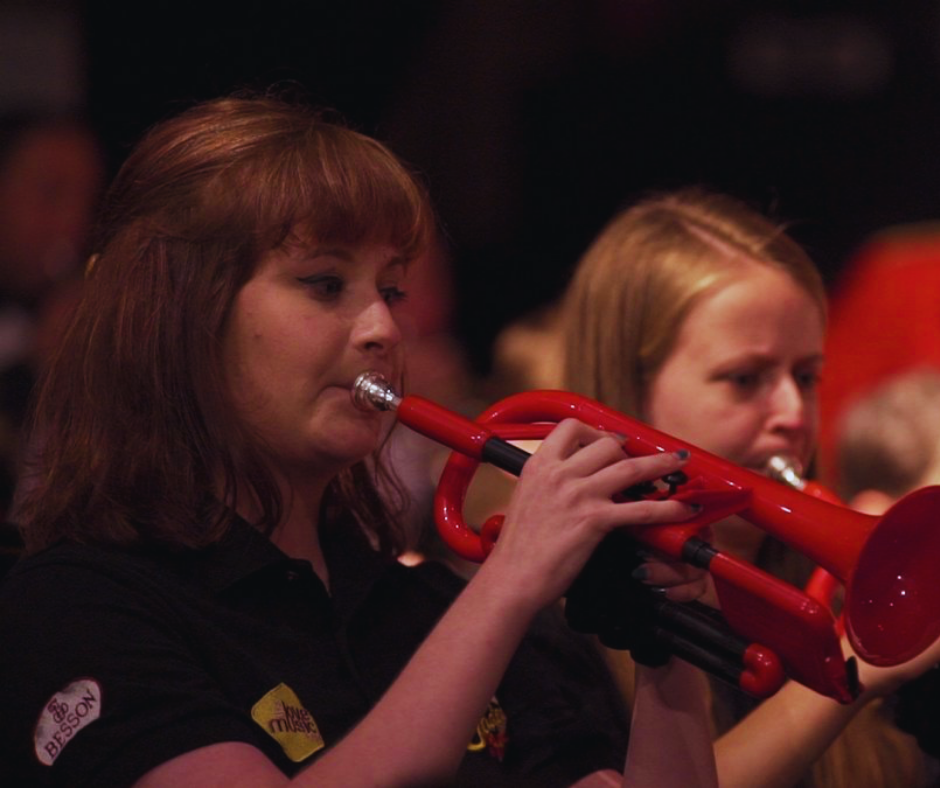
So you’re thinking about picking up a shiny new brass instrument for yourself or someone you love. Fantastic! Learning to play an instrument has a number of proven benefits: stress relief, improved cognitive abilities, boosted confidence, a better memory, and so much more. You're making a great choice.
But you have questions, right? Of course you do. Learning a new skill can take time. You want a rough idea of exactly how long it’ll be before you’re kicking brass and taking names, and if it’s even worth it. In this article, we’ll talk you through how long it takes to learn a brass instrument, and how we can help you on this first step in your musical journey.
Read on to find answers to the following questions:
- How long does it take to get good at a brass instrument?
- What age is best to start learning an instrument?
- Am I too old to start learning an instrument?
- Which is easier, trumpet or trombone?
- Is learning an instrument worth it?
How long does it take to get good at a brass instrument?
I’m sure you saw this coming, but the answer to this one really does depend on a number of things. The type of brass instrument you choose is a major factor, of course, and the age you start plays a role. The definition of what it means to “get good” could also vary wildly from person to person - and let’s not forget that some people simply will take to an instrument more naturally than others.
On average you’ll want to put in at least 30-50 minutes of practice 4-5 times a week, after which you should be able to play a decent number of easy songs within just a couple of months. Keep at it and you could be onto intermediate to advanced pieces within a year or two. It’s also important to remember that learning to read music is a crucial skill in itself that can take time to get to grips with.
Again, this is a very general rule as there are far too many variables involved in the music-learning process! Some people may require much more practice, and some may pick it up with impressive speed! You’ll also want to consider finding a music teacher to help if you can. Fortunately, we have an in-depth guide designed to get you started on your musical journey, complete with tips to help find a teacher, learn to read music, and more.
What Age Is Best To Start Learning An Instrument?
You’ve probably heard that it’s better to learn a new language from as early an age as possible because a child’s brain is much more capable of absorbing and retaining information. Well, the same is largely true when it comes to learning an instrument.
Obviously, we’re not suggesting you shove a trombone in little Jimmy’s face the second he turns two, but you’ll want to consider introducing your child to an instrument from anywhere between four and seven years old.
Fortunately, there are a number of specially designed instruments for this early and vital stage in your child’s musical journey. The pBugle is a fantastic and affordable first trumpet, while the pBuzz is by far the easiest way for kids to start their trombone journey. Both products are durable, hassle-free, and a genuinely fun first step on the road to learning an instrument.
Am I Too Old To Learn An Instrument?
Of course not. Just because four-seven is the ideal age, that doesn’t mean you’ve missed your chance to pick up a new skill! While you might have a slightly harder time of it than you would have if you’d started younger, all you really need is patience and time to practice. Finding that time can be easier said than done when you’re a busy adult, obviously, but if you really want to learn? You’ll find that time.
Which Is Easier, Trumpet Or Trombone?

Ah, the big question: is it easier to learn trumpet or trombone? We get asked this one so much that we actually have a dedicated blog post on the topic already, but if the idea of clicking another link sounds exhausting to you, we can break it down again right here.
In very simple terms, the trombone is easier to get your first sounds on because it has a larger mouthpiece. That makes it easier to get a 'buzz' from the beginning.
Meanwhile, the trumpet is easier to get on with in terms of hold and posture. It’s easier to progress with once you really start to get the hang of it, as valves are more straightforward to operate than a slide.
Of course, you shouldn’t really just go for the instrument you think is going to be an easier time. Which one is the right fit for you, your child, or your loved one? Which one do you prefer the look of? Which one do you think makes a better sound? These are questions only you can answer. Take a look at our detailed guides on how to play the trumpet and how to play the trombone, and have a think!
The pInstrument Musical Journey
While we can’t answer every question for you in terms of which instrument is the best fit, we can certainly help you on your journey.
Each one of our products is specially designed to make the musical journey as fun and affordable as possible. You'll remember we mentioned the pBugle and pBuzz earlier. These are wonderful first instruments aimed at younger players which will help them get used to the basics of brass and prepare them to move on to the next level.
The pCornet and pTrumpet are lightweight, easy to hold, and perfect for younger players and beginners alike. Meanwhile, the pTrumpet hyTech is a high-quality and affordable student trumpet that's great for beginners or students at any level.
You can head here to find out which instrument is right for you or take a look at the charts below to see a breakdown of our pTrumpet and pBone journeys. Whichever instrument you choose, we're with you every step of the way.
| Instrument | pBugle | pCornet | pTrumpet | hyTech |
| Weight | 250g/ 0.5lbs | 500g / 1.1 lbs | 500g / 1.1 lbs | 650g / 1.4 lbs |
| Comes With | 7C plastic mouthpiece. | Cloth bag. 2B and 4B plastic mouthpieces. | Fabric Bag. 3C and 5C plastic mouthpieces. | Gig bag / backpack. 7C silver plated mouthpiece. Works with any standard trumpet mouthpiece. |
| Colour Choices | 🔴 | 🔴 🔵 |
🔴 🔵 ⚪ 🟡 🟠 ⚫ 🟣 |
⚫ |
| Price From | £29.95 | £109 | £139 | £175 |
| Instrument | pBuzz | pBone Mini | pBone |
| Weight | 250g / 0.5 lbs | 500g / 1.1 lbs | 800g / 1.8 lbs |
| Comes With | Custom made plastic mouthpiece. | Fabric Bag, Custom made plastic mouthpiece. | Fabric Bag, 6.5AL and 11C plastic mouthpieces. |
| Colour Choices | 🔴 | 🔴 🔵 |
🔴 🔵 ⚪ 🟡 🟠 ⚫ 🟣 🟢 |
| Price From | £19.99 | £109 | £149 |
Is Learning An Instrument Worth It?
If you've read this far then we'd hope you've realised by now that learning an instrument is one of the best things you can do. Performing and creating music, whether alone or with a group, is as enriching, engaging, and rewarding an experience as anyone could hope to have.
Benefits of learning an instrument include, but are by no means limited to:
- Stress relief
- Creative outlet
- Improved confidence
- New friends
- Learning to work as a team
- A sense of achievement
- Improved discipline, memory, and patience
- And so much more!
And that's before we even get into all the unique benefits of the pBuzz and the rest of our pInstruments!
Should I Give Up Learning An Instrument?
Absolutely not! Learning an instrument can be tricky, and there will doubtless be days when you (or the person you're trying to help learn) feel like no progress is being made. This is totally normal.
If the question of quitting ever comes up, simply ask yourself again why you started in the first place. Consider all those wonderful benefits you're getting from learning, and think about how you feel on your very best days of playing. Then, just think about how much better you'll be in a few weeks/months/years. We promise that one day you'll look back on the day you thought about packing it in and laugh.
As always, if you have any more questions or concerns after reading this article, we're more than happy to help you out. Don't be shy, and get in touch!
After seven years writing about video games, Ewan made the jump to the music instrument industry to stop his family asking when he was going to get a real job. Mostly, though, he adores music and is passionate about its vital role throughout life - especially in education. He also played guitar in several bands with deeply embarrassing names that won't be revealed here. With a degree in journalism from an NCTJ-accredited university under his belt, Ewan uses everything he learned as a writer over the last decade to help answer any questions you might have about pBone Music in an accessible (and hopefully entertaining) way. Because if you can write 1,000 words on SSDs and ray-tracing, you can explain why plastic instruments are accessible, sustainable, and fun.
